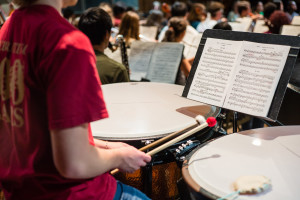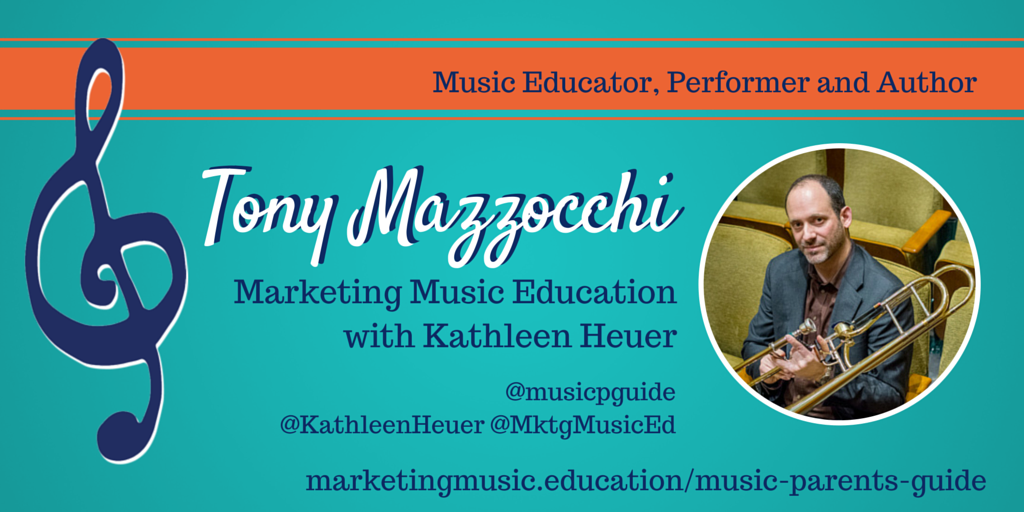 For the first time ever, music is now cited in federal statute as a stand-alone subject in schools.
For the first time ever, music is now cited in federal statute as a stand-alone subject in schools.
The timing could not be better. After all, provision for the arts in school curricula should be a no-brainer requirement of a well-rounded education. However, just because federal law is changing does not mean that schools are going to immediately adjust their schedules accordingly.
Our information age has become central (for better or worse) in shaping and influencing every waking moment of children’s daily lives – mostly toward a lifetime of consumption and a de-emphasis on creative thought. But if schools enable children to not only have ideas about the world, but to be active participants in it, we will be able to effectively develop a range of qualities and skills in our youth that will empower them to operate in this new age as agents of change instead of apathetic onlookers.
Our society desperately needs to value more than just academic abilities. Our children have unlimited potential and so much more to offer than just good test grades. Music exemplifies these other capacities — intuition, practical skills and creativity, to name a few. Make no mistake: all of our children’s growth will be stunted without music in their lives as part of their school day. If schools do not appropriate the proper resources to music education, our new federal law will do our children little good. And “guided resources” have less to do with actual finances and more to do with changing a long-established negative attitude towards the arts as peripheral to a well-rounded education.
Here are three reasons we need music in our country’s schools now more than ever before:
Music brings us together. Turn on the TV and it won’t take long to see violence, hate, and divisiveness in our country and our world — dark aspects of the human condition that riddle us with fear for the safety of our future generations. Participation in music provides social benefits for students that we desperately need right now in order to perpetuate an acceptance of all walks of life in our society. In short, music is a way to make friends and coexist with others in peace during every school day. Practicing and performing in ensembles is a unique opportunity to socialize with like-minded people, make new friends and meet interesting people from around the world who, without this musical engagement, would not have had the opportunity to meet. Music is blind to academic levels, cultural differences and socio-economic spectra.
Our children need balance in their existence. Right now, schools educate one side of our children’s brains; a little bit of their bodies; and barely any of their souls. There is no doubt that music provide core ways of developing our understanding of our world — there is no way that children will develop their full intelligence and abilities without it in their school life. You see, no one can argue that academic ability isn’t valuable in life, but separating this from other human capabilities in our education system is disastrous on many levels. There is a powerful relationship between emotion through mediums like music and intellect — in both tangible and intangible ways. We need this connection in our schools now more than ever.
Right-brained thinkers will soon rule our world. Gone are the days of logical, linear and reductive thinking running the educational show. The future belongs to creative humans — artists, inventors, designers, and emotional thinkers who manipulate information that is readily available to all of us and deftly turn it into something new. Every child has this capacity — right on the “other side” of their brain — and schools are far behind when it comes to tapping into it. Through years of over-testing, we have seen one type of student flourish while another fails. But this divide (mostly across cultural and socio-economic spectrum) is not a mirror of what is really happening in our world. “Left-Brain” capabilities are not enough, which is why music and the arts is not only crucial as a part of school curricula, it must be an every day part of it.
Through years of brain study, we now know that there are various kinds of ways of thinking and various kinds of intelligence. None of these ways has the right to dominate the others in our school curricula and means of assessment. Our society desperately needs young people who are creative, empathetic, collaborative and mindful thinkers. Creative work — specifically in music — is exactly what our children need right now. They need to play, experiment, expend sustained effort, produce work of high quality, and engage in a unique social environment that leads them on the road to achieving a beautiful and successful adulthood.
There are many forces working against our children in our society, but some of these we can control — including the way we educate them. We all need music now more than ever in our schools.








Good article that offers undeniable benefits that children (and adults for that matter) derive from involvement in music. I believe there are much more compelling arguments for enlarging rather than maintaining the role music plays in the American educational system.
1) Music is a 2 hemisphereic brain activity that promotes both creative and analytical thinking. Playing a musical instrument engages more of the brain than just about any other human activity.
2) It promotes literacy. As children learn to read music, they are learning grammatical and syntactical rules that closely resemble those of written and spoken language as well as those used to write computer code.
3) Involvement in music promotes critical listening skills that students need across the academic curriculum. In other words, children in music programs are better listeners.
4) Students in school music programs demonstrate better academic performance, and higher graduation rates (meaning lower dropout rates) than students with no musical involvement.
5) Playing and practicing a musical instrument helps children develop proprioceptively.
6) Practicing on a musical instrument teaches children of working consistently and diligently to achieve a desired goal. Learning a piece of music is its own reward,
These 6 points are only the beginning of a very long list.
This is SO true. I never hear people say “I am so glad I never had music as part of my life” as opposed to those who say “I wish I had stuck with those piano/guitar/___ lessons when I was younger!” I was so fortunate to accidentally have musical education from 8th grade through high school graduation, but it changed my life in so many ways. While I did not pursue a career in music, I found it so interesting that in my chosen fields of accounting, finance, and computer science SO MANY of my peers had a musical education background! They may have professed that they were reluctant clarinetists, mediocre violists, or even prodigal percussionists (like my son!) that decided to put their musical instruments on the shelf, but they all bragged proudly about their musical experience and how it shaped how they got to where they are today.
We need to make sure that everyone gets the opportunity to experience a rich musical education throughout middle and high schools! The future of our culture and country depends on it!